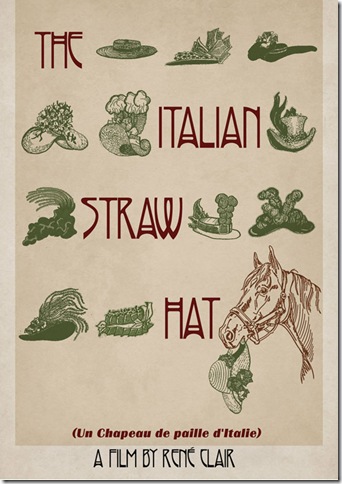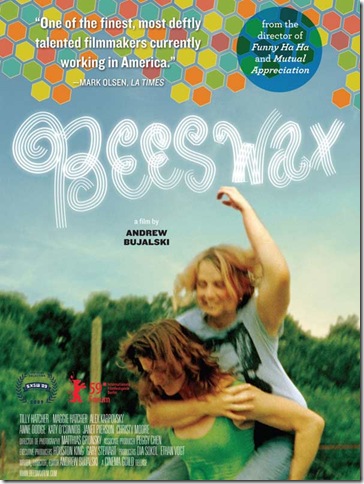The Italian Straw Hat (Flicker Alley)
Release date: April 6
Standard list price: $23.99
In the movies and the theater, the institution of marriage is not often a melodious tradition, with infidelity and domestic strife serving as effective dramatic devices for more than a century. But day-to-day wedlock is downright harmonious compared to the ceremony leading up to it. Cinematic or stagebound weddings are inherently negative rites, and not just the big, fat, Greek kind. Filmic weddings have ranged from mild culture-clash discomfort to all-out, corpse-falls-in-the-cake catastrophe. Weddings have been veritable monsoons long before Mira Nair introduced us to Indian knot-tying, and Robert Altman, whose epic pastiche A Wedding is a trademark example of the genre, even said in his commentary track for the DVD that he’d never been to a wedding where something didn’t go wrong.
Looking at René Clair’s finally released silent masterpiece The Italian Straw Hat (1927), it’s clear that the nuptial disaster story dates at least to the mid-19th century. The movie is based on an enduring French farce from 1851 of the same name, focusing on a groom who, en route to his wedding via horseback, loses his coachwhip to the wind, setting in motion a chain of calamities: His wandering horse munches on a woman’s straw hat, the woman and her militaristic husband – his handlebar mustache signifying his villainy — turn out to be guests at the wedding, and the husband threatens to destroy the bourgeois house if the man doesn’t fetch a hat of the exact quality and dimensions and restore his wife’s honor.
To reveal more of the plot would be a disservice to the inspired antics that follow, but suffice it to say that mistaken assumptions, unforgettable characters, and bravura comedic set pieces don’t age the film a day. Fans of Clair’s later sound films, such as Le Million and Under the Roofs of Paris, will find a worthy peer to those effervescent cinematic truffles.
Many have waited a long time for a Region 1 release of The Italian Straw Hat, while for others, this will be their introduction to the film. Flicker Alley, a distributor known for painstakingly restoring and bringing renewed interest to silent cinema, has released a superlative edition, which includes two essays from film scholars, the option of two musical scores, a DVD-rom extra of a 1916 English translation of the original play and, most significantly, two short films – the 1907 one-reel farce Fun After the Wedding (not directed by Clair), and La Tour, Clair’s own color-tinted 1928 documentary of the Eiffel Tower.
Filming the tower from just about every vantage point imaginable, Clair’s restless camera superimposes different parts of the tower over each other, dollies up and down the enormous edifice and hides in its nooks and crannies. The result is the illusion of endless motion, and we begin to wonder if Clair himself or the tower’s own mechanisms are directing the motion.
Frankly, this short film alone makes the disc worth renting or buying; the fact that it’s simply an extra to one of the great wedding crashes in movie history is all the more remarkable.
Beeswax (Cinema Guild)
Release date: April 6
SLP: $26.99
Emerging onto the nascent mumblecore movement with 2002’s observant Gen-Y dramedy Funny Ha Ha and refining his verité style to uncomfortable perfection with 2005’s Mutual Appreciation, writer-director Andrew Bujalski is maturing more into a darling of the art house with every picture.
His latest is Beeswax, set in Austin, Texas, which centers on two fraternal twin sisters: wheelchair-bound Jeannie (Tilly Hatcher), who is facing the possibility of legal action against the woman with whom she cofounded a vintage clothing shop, and her wilder kin Lauren (Maggie Hatcher), who is considering a career-changing teaching position in Nairobi. Other characters bounce around the film’s periphery, most notably Merrill (Alex Karpovsky), a law student attracted to Jeannie but who may have had a past fling with Lauren.
The film reinforces Bujalski’s previous themes of emotional and physical displacement among urbane hipsters, but without anything resembling a satisfying catharsis or a psychological justification for its characters’ actions. Instead, we, as voyeurs in Bujalski’s elliptical character study, are asked to paint our own meaning into the proceedings, and it’s a liberating experience. I dare say the way Bujalski juggles love and friendship and legal and moral issues without a hint of scripted artifice ranks him alongside improvisatory masters such as Jacques Rivette and John Cassavetes.
Icons of Suspense: Hammer Films (Columbia)
Release date: April 6
SLP: $22.49
The production company Hammer Films is synonymous with low-budget horror mastery, and this third collection from Columbia compiles some of the more interesting Hammer entries from the late ’50s and early ’60s. The horror titles on which Hammer made its reputation – such as Brides of Dracula, Curse of the Werewolf, The Curse of the Mummy’s Tomb and Evil of Frankenstein – played off familiar genre characters and archetypes, but this collection of six suspensers focuses on the perversion of human psychology rather than the terror of inhuman monsters.
All of the movies are new to DVD and provide a terrific introduction to an underrated area of Hammer Films. Highlights include Joseph Losey’s futuristic dystopia These Are the Damned; Maniac, about a bizarre mother-daughter threesome gone awry; and Never Take Candy From a Stranger, one of the cinema’s earliest character studies of a child molester, as shocking and timely as ever.
Bad Lieutenant: Port of Call New Orleans (First Look)
Release date: April 6
SLP: $14.99
The only bad thing about First Look’s Bad Lieutenant: Port of Call New Orleans DVD is the packaging. The box art couldn’t look more generic if it tried, and the tagline – “The only criminal he can’t catch is himself” – is cringe-worthy. Obviously, the movie is being marketed as just another conventional cop thriller, a deceptive move when dealing with a movie this utterly gonzo. There’s never been a film quite this hilariously subversive or subversively hilarious; I’m convinced it would have made many more top 10 lists last year if more critics had seen it.
The latest playful exercise from the always unhinged Werner Herzog, Bad Lieutenant shares its name with a 1992 masterpiece by Abel Ferrera, but it’s not so much a sequel to the original Bad Lieutenant as it is as an alternative take on a similar character. Transplanting its corrupt, strung-out cop (a wild-eyed, hulking Nicolas Cage) onto the streets of post-Katrina New Orleans, Herzog is not interested provoking controversy or exploring religious conversion, as Ferrera did with his Bad Lieutenant. Instead, he’s out to make a self-consciously absurd comedy that parodies contemporary policiers while at the same time being one, a result that is both poker-faced and winking at the same time. Don’t let the packaging bore you – this film is a true original.


